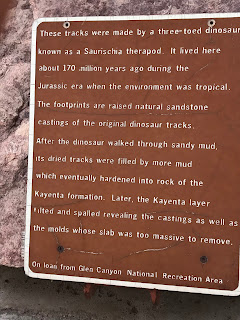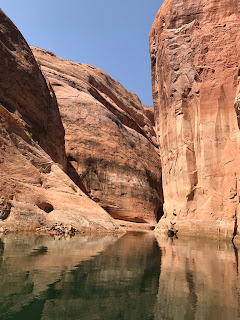Even
after getting out of our diving business and selling our company we are still attracted to
dams. So we toured Glen Canyon Dam. Glen Canyon Dam is 710 feet tall, it’s a concrete arched-gravity dam with over 5 million tons poured, . The Dam holdings the Colorado river back creating Lake Powell, one of the largest man-made reservoirs in the U.S. with a
capacity of 27 million area feet. Since first filling to capacity in 1980,
which took 17 years to fill, Lake Powell water levels have fluctuated greatly
depending on water demand and annual runoff. Operation of Glen Canyon Dam helps
ensure an equitable distribution of water between the states of the Upper
Colorado River Basin (Colorado,
Wyoming, and most of New Mexico and Utah) and the Lower Basin
(California, Nevada and most of Arizona). During years of drought, Glen
Canyon guarantees a water delivery to the Lower Basin states, without the need
for rationing in the Upper Basin. In wet years, it captures extra runoff for
future use. The dam is also a major source of hydroelectricity,
averaging over 5 billion kilowatt hours
per year.
When we were there the lake was at
57% capacity which accounts for the ¼ boat ramp and a walk to the beach was ¾
mile. (yes one way). The dam provide 3 major functions, storage of water and controlled release, electricity, and recreation (Lake Powell). Lake Powell has over 2 million visitors a year and I know why.
During construction of the dam the bridge was needed first. The bridge above, it was and still is the major connection, otherwise it was over a hundred miles around trip.
Generators
Top of dam
Bottom of dam (couldn't get it in one picture)
























































